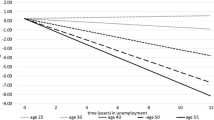Abstract
Using longitudinal data, the current study examined the relation between mental health and unemployment. It was assumed that these concepts would mutually influence each other—that is, while the perceived characteristics of the situation of being unemployed affect mental health, mental health may also influence the intention to look for a job, amount and type of job-searching behavior, and the chances of finding a job. Drawing on partly longitudinal data from 229 unemployed Dutch youth, a model relating mental health, perceptions of the unemployment situation, job-searching behaviors, and employment status was tested using structural equation modeling and logistic regression analysis. While the expectations were largely supported, there were also several unexpected results, most notably that participants who felt powerless were more likely to be active job seekers, while only mental health (and not job-seeking behavior) was (weakly) related to the likelihood of finding a job.
Similar content being viewed by others
REFERENCES
Aldrich, J. H., & Nelson, F. D. (1984). Linear probability, logit, and probit models. Beverly Hills: Sage.
Banks, M. H. (1983). Validation of the General Health Questionnaire in a young community sample. Psychological Medicine, 13, 349–353.
Bentler, P. M., & Bonett, D. G. (1980). Significance tests and goodness of fit in the analysis of covariance structures. Psychological Bulletin, 88, 588–606.
Catalano, R., Aldrete, E., Vega, W., Kolody, B., & Aguilar-Gaxiola, S. (2000). Job loss and major depression among Mexican Americans. Social Science Quarterly, 81, 477–487.
Feather, N. T. (1982). Expectations and actions: Expectancy-value models in psychology. Hillsdale, NJ: Erlbaum.
Feather, N. T. (1990). The psychological impact of unemployment. New York: Springer Verlag.
Feather, N. T. (1992). Expectancy-value theory and unemployment effects. Journal of Occupational and Organizational Psychology, 65, 315–330.
Feather, N. T., & O'Brien, G. E. (1987). Looking for employment: An expectancy-valence analysis of job-seeking behaviour among young people. British Journal of Psychology, 78, 251–272.
Feij, J. A., Peiró, J. M., Whitely, W. T., & Taris, T. W. (1995). The development of career enhancing strategies, and content innovation: A longitudinal study of new workers. Journal of Vocational Behavior, 46, 231–256.
Finney, D. J. (1971). Probit analysis. Cambridge: Cambridge University Press.
Fryer, D. (1997). International perspectives on youth unemployment and mental health: Some central issues. Journal of Adolescence, 20, 333–342.
Goldberg, D. (1972). The detection of psychiatric illness by questionnaire. London: Oxford University Press.
Hammarstroem, A., & Janlert, U. (1997). Nervous and depressive symptoms in a longitudinal study of youth unemployment: Selection or exposure? Journal of Adolescence, 20, 293–305.
Helbing, J. C. (1987). The self in career development: Theory measurement, and counseling. Unpublished Ph.D thesis, Universiteit van Amsterdam, Amsterdam.
Jahoda, M., Lazarsfeld, P. R., & Zeisel, H. (1933). Marienthal: The sociography of an unemployed community. London: Tavistock.
Jöreskog, K.G., & Sörbom, D. (1993). LISREL-8. Chicago: Scientific Software.
Kulik, L. (2000). Jobless men and women: A comparative analysis of job search intensity, attitudes toward unemployment and related responses. Journal of Occupational and Organizational Psychology, 73, 487–500.
Leana, C. R., & Feldman, D. C. (1995). Finding a new job after plant closing: Antecedents and outcomes of the occurrence and quality of reemployment. Human Relations, 48, 1381–1401.
Leeflang, R. L., Klein Hesselink, D. J., & Spruit, I. P. (1992). Health effects of unemployment: I. Long-term unemployment men in a rural and an urban setting. Social Science and Medicine, 34, 341–350.
Lerner, R. M. (1982). Children and adolescents as producers of their own development. Developmental Review, 2, 342–370.
Lubin, B. (1965). Adjective checklists for the measurement of depression. Archives of General Psychiatry, 12, 57–62.
Lynd-Stevenson, R. M. (1999). Expectancy-value theory and predicting future employment status in the young unemployed. Journal of Occupational and Organizational Psychology, 72, 101–106.
McFadyen, R. G. (1995). Coping with threatened identities: Unemployed people's self-categorizations. Current Psychology: Developmental, Learning, Personality, Social, 14, 233–256.
Ryff, C. D., & Singer, B. (1998). The contours of positive health. Psychological Inquiry, 9, 1–28.
Schaufeli, W. B. (1997). Youth unemployment and mental health: Some Dutch findings. Journal of Adolescence, 20, 281–292.
Schaufeli, W. B., & Van Yperen, N. Y. (1992). Unemployment and psychological distress among graduates: A longitudinal study. Journal of Occupational and Organizational Psychology, 65, 291–305.
Taris, T. W. (2000). A primer in longitudinal data analysis. London: Sage.
Taris, T. W., Bok, I. A., & Caljé, D. G. (1998). On the relation among job characteristics and depression: Evidence for reciprocal effects? International Journal of Stress Management, 5, 157–167.
Taris, T. W., Heesink, J. A. M., & Feij, J. A. (1995). The evaluation of unemployment and jobsearching behavior: A longitudinal study. Journal of Psychology, 129, 301–314.
Van Horn, J. E., Taris, T. W., Schaufeli, W. B., & Schreurs, P. J. G. (2001). A multi-dimensional approach to measuring teacher well-being. Manuscript under editorial consideration.
Van Rooijen, L. (1977). Enige gegevens over de VROPSOM lijsten voor de bepaling van depressieve gevoelens [Some information about the determination of depressive feelings]. Amsterdam: Vrije Universiteit.
Van Rooijen, L., & Vlaander, G. P. (1984). Dramatic induction of depressive mood. Journal of Clinical Psychology, 40, 1318–1322.
Warr, P. B. (1994). A conceptual framework for the study of work and mental health. Work and Stress, 8, 84–97.
Warr, P. B., Jackson, P., & Banks, M. (1988). Unemployment and mental health: Some British studies. Journal of Social Issues, 44, 47–68.
Author information
Authors and Affiliations
Rights and permissions
About this article
Cite this article
Taris, T.W. Unemployment and Mental Health: A Longitudinal Perspective. International Journal of Stress Management 9, 43–57 (2002). https://doi.org/10.1023/A:1013067101217
Issue Date:
DOI: https://doi.org/10.1023/A:1013067101217




